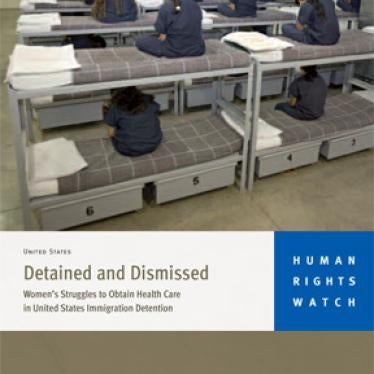U.S. Immigration and Customs Enforcement is known by many who deal with it by its acronym: ICE. The name is well-deserved for its treatment of the immigrant women locked up in its detention system.
The ICE detention system - supposedly administrative and non-punitive - routinely subjects women to gratuitous suffering and humiliation.
ICE shackles pregnant women with no criminal background or history of violence. ICE ignores requests for care from women in terrifying and debilitating situations - going blind from unchecked diabetes, for instance, or writhing in pain from an untreated ovarian cyst.
This system is virtually hidden from public view. There is virtually no oversight, the agency has developed very few standards for how these women should be treated and the vast majority of them do not have lawyers.
ICE detains well over 300,000 immigrants each year - more than 30,000 on any given day, at a cost of $95 a day each - in the fastest growing form of incarceration in the country. Women make up 10 percent of the average daily detention population, and their numbers are growing. But who are the women that ICE has chosen to throw in jail?
- Nana B. from Guinea, who watched her sister die from infection after being subjected to female genital mutilation and who fled to the United States because she decided she could not let that be her daughter's fate.
- Antoinette L. from Haiti, who lived in the U.S. for more than two decades as a lawful permanent resident, working hard, paying taxes, and raising two U.S. citizen sons on her own.
- Kathryn I. from Mexico, brought here at age 3 by parents trying to make a better life, for whom this country is the only home she has ever known.
And thousands more.
In our recent report, Human Rights Watch documented the many ways these women struggle to obtain even basic medical care from their jailers. Based on interviews with 48 women currently or recently detained by ICE, the report describes detention facilities that do not even provide women with enough sanitary pads to keep from bleeding through their clothes, to say nothing of treatment for breast or cervical cancer, prenatal care for high-risk pregnancies or care to address the consequences of physical and sexual violence.
The heartbreak and sympathy that these tragedies inspire is matched only by the anger and indignation of knowing that they are unnecessary. These problems are solvable. ICE has failed to take even the most basic steps: Despite detaining thousands of women, it has few specific requirements for staff to meet the women's health needs. What detention standards it has are not enforceable because they are not embodied in federal regulations.
Health services available in detention are limited almost exclusively to emergency care. In some respects, the care fails to measure up even to what is available to convicted criminals in the U.S. prison system. These are serious problems, but there are easy fixes: improve standards, issue regulations and expand the scope of care.
There is a broader question about immigration detention of course, and that is why the U.S. is detaining most of these people in the first place. The majority detained by ICE have no criminal background and are simply awaiting the adjudication of their immigration cases, an administrative matter. In most cases, detention is neither necessary nor cost-effective. Studies have shown that alternatives such as supervised release programs, at about one-fifth the cost, are effective in ensuring that people show up for their immigration hearings.
But until this system changes, the government needs to provide adequate health care for people in detention. International standards and U.S. law make clear that people detained by the government are entitled to the same standard of health care they would receive in the community.
The real issue here is a simple matter of political will. Recent developments, including the appointment of a special adviser on detention to the secretary of homeland security, suggest the new administration is taking this responsibility seriously.
But will the Obama administration have the political will to make the necessary changes so that we no longer hear the horror stories about shackled pregnant women or women being denied life-saving care? The new administration needs to make sure that it brings "change" to everyone in America - including the people America detains.






